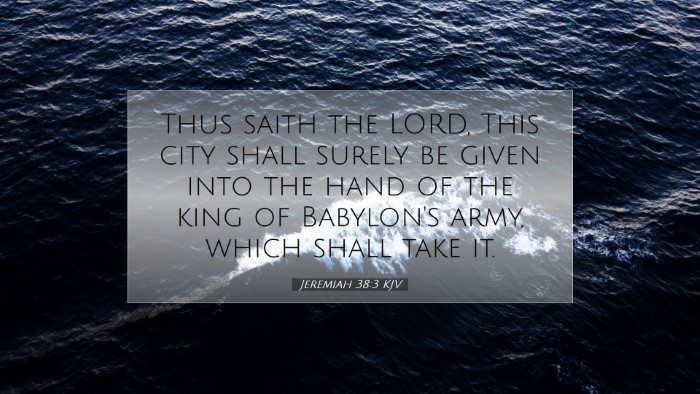Commentary on Jeremiah 38:3
Verse Overview: Jeremiah 38:3 states, “Thus saith the Lord, This city shall surely be given into the hand of the king of Babylon’s army, which shall take it.” This verse is part of a larger narrative regarding the fate of Jerusalem and the prophetic declaration of its impending destruction.
Contextual Background
This verse is situated during a crucial period in Israel’s history, a time marked by political turmoil and spiritual decline. The prophet Jeremiah, often referred to as the “weeping prophet,” is the voice of God amidst a people who have turned away from Him.
Insights from Public Domain Commentaries
Matthew Henry's Commentary
Divine Certainty: Matthew Henry underscores the certainty of God’s judgment as declared through Jeremiah. He notes the phrase “Thus saith the Lord” emphasizes the divine authority behind the proclamation. There is an assurance that the prophetic words are not merely predictions but definitive statements of God's will.
City of Jerusalem: Henry elaborates on the city of Jerusalem, once the center of divine presence and worship, now standing on the brink of destruction due to the people’s rebellion against God. The impending capture by Babylon is seen not just as a political event but as a spiritual consequence of unfaithfulness.
Albert Barnes' Notes on the Bible
The Significance of Prophecy: Barnes emphasizes the importance of prophetic declarations in understanding the relationship between sin and judgment. The inevitability of Jeremiah’s message highlights God's judgment against a nation that forsakes its covenant with Him. This verse serves as a sobering reminder of God’s sovereignty and justice.
Historical Context: In response to the socio-political unrest, Barnes situates this verse within the larger context of Jeremiah's ministry, illustrating how prophecy often intersects with historical events. The warnings issued serve both as judgment and as a call to repentance, although largely unheeded by the populace.
Adam Clarke’s Commentary
Emphasis on Submission: Clarke provides insight into the nature of the exhortation found in the prophetic call for submission to Babylon. He addresses the resistance that Jeremiah faced from his contemporaries, who preferred false hope over the harsh realities of God's judgment.
Moral Lessons: Clarke masterfully relates this historical account to present-day believers. He urges that the lessons from Jerusalem's downfall serve as cautionary tales for Christians, stressing the necessity of aligning one's life with God’s will and the dire consequences of a persistent hard-heartedness.
Theological Implications
This verse, rich in theological significance, prompts reflection on God's unchanging nature amidst human folly. The message of inevitable judgment invites serious contemplation regarding themes of repentance, divine sovereignty, and the seriousness of God’s word.
- Repentance: The call for change, pivotal in prophetic literature, echoes resoundingly. The acknowledgment of sin and the return to God is a repeating theme throughout Scripture.
- Sovereignty of God: God’s control over nations and events signals to believers that history is not random but divinely orchestrated according to His purposes.
- The Role of Prophets: Understanding the role of the prophets in bringing forth God’s message serves pastors and theologians as they navigate contemporary issues faced by the church today.
Application for Today
In our contemporary context, Jeremiah 38:3 can be applied in various ways:
- Awareness of Consequences: Just as Jeremiah warned Jerusalem, modern believers must understand the consequences of turning away from God. Sin leads to separation from God and chaos in both personal and communal aspects of life.
- Call to Leadership: The reluctance of leaders to accept Jeremiah’s message speaks to the need for courage and integrity in spiritual leadership today. Pastors and church leaders are called to speak the truth, even when it is uncomfortable.
- The Importance of Repentance: This verse should stir believers to examine their lives continuously and to call others to seek God earnestly. A heart that is responsive to divine prompting prevents community and individual crises.
Conclusion
Jeremiah 38:3 serves as a poignant reminder of God's sovereignty and the consequences of national and personal unfaithfulness. The insights gathered from ancient commentaries illuminate the enduring nature of God's warning, beckoning modern readers to heed the lessons of Scripture. As ministers, scholars, and laypeople engage with these texts, they uncover rich layers of meaning that challenge and inspire a faithful walk with God.


